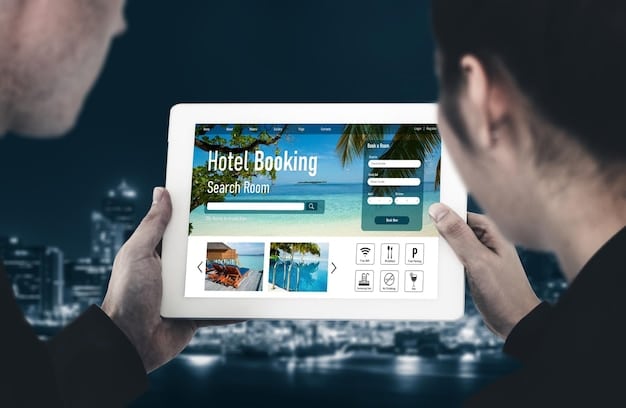Travel Hacking Apps: Your Ultimate Guide to Deals & Savings

Anúncios
Travel hacking apps empower users to strategically leverage technology for significant savings and enhanced experiences, transforming the way modern travelers find deals on flights, accommodation, and activities by offering real-time data, loyalty program maximization, and exclusive offers.
Anúncios
In today’s dynamic travel landscape, the promise of exploring new horizons often comes with the practical challenge of managing costs. This is where Travel Hacking Apps: The Best Tools to Find Deals and Save Money on the Go become indispensable. Far from mere booking platforms, these sophisticated applications are designed to empower the modern traveler, offering unprecedented access to deals, rewards, and insights that can significantly reduce the financial burden of wanderlust. Whether you’re a seasoned globetrotter or planning your first big adventure, understanding and utilizing these tools can transform your travel finances and unlock opportunities you never thought possible.
The art of travel hacking: More than just discounts
Travel hacking, at its core, is the strategic accumulation and redemption of loyalty points, miles, and discounts to minimize travel expenses. It’s an art form that blends financial savvy with a passion for exploration. In recent years, the digital revolution has democratized this practice, bringing sophisticated tools directly to our fingertips. Travel hacking apps are the cornerstone of this evolution, evolving from simple booking engines to comprehensive platforms that orchestrate complex savings strategies.
These apps leverage vast networks of data, employing advanced algorithms to identify fleeting opportunities that traditional booking methods often miss. They don’t just show you the cheapest flight; they help you understand why it’s cheap, when to book, and how to maximize every loyalty point you’ve earned. This shift from reactive searching to proactive strategy is what truly defines modern travel hacking.
Anúncios
Understanding the core principles
To effectively use travel hacking apps, it’s crucial to grasp the underlying principles that make them so powerful. It’s not about magic, but methodical planning and smart use of available resources. These apps streamline processes that once required extensive manual research, from tracking flight prices across multiple airlines to comparing hotel rates with loyalty program benefits.
- Dynamic Pricing Insights: Apps often predict price fluctuations, advising on the optimal time to book.
- Loyalty Program Integration: Seamlessly link and track points from various airlines, hotels, and credit cards.
- Error Fare Alerts: Spot incredibly low prices due to technical glitches or human error before they’re corrected.
- Bundle Deals: Identify packages that combine flights, hotels, and car rentals for greater savings.
Beyond these functions, the apps foster a community of informed travelers, sharing tips and tricks that amplify individual savings. They transform travel planning from a chore into an exciting game of optimization, where every saved dollar translates into a richer experience or a longer journey.
The true value of these apps lies not just in their ability to save money, but in their capacity to open up travel opportunities that might otherwise be out of reach. By reducing lodging or transportation costs, they free up budget for immersive experiences, local cuisine, or adventurous excursions, enriching the entire travel experience. This holistic approach makes them an indispensable part of the modern traveler’s toolkit, providing a competitive edge in the quest for affordable adventure.
Essential apps for flight deals and airfare tracking
Flights often represent the largest single expense in any travel budget, making flight-centric travel hacking apps incredibly valuable. These tools go beyond basic search engines, offering predictive analytics, error fare alerts, and flexible date comparisons that can shave hundreds off your airfare. They are designed to exploit the natural volatility of airline pricing, turning price drops and special offers into tangible savings for the user.
The sophistication of these apps lies in their ability to monitor billions of data points in real time. They track demand, historical pricing patterns, and even competitor pricing to give users the best possible advice on when and how to book. This level of insight was once exclusive to travel agents, but now it’s accessible to anyone with a smartphone, leveling the playing field for budget-conscious travelers.
Top picks for airfare optimization
When it comes to securing the cheapest flights, several apps stand out for their innovative features and user-friendly interfaces. Each offers a unique perspective on flight searching, catering to different travel styles and preferences. Understanding their distinct advantages is key to choosing the right tool for your next journey.
- Hopper: Known for its predictive algorithm, Hopper advises whether to book now or wait for a price drop, claiming up to 95% accuracy. Its “price freeze” feature allows users to lock in a price for a small fee.
- Skyscanner: This app excels at finding the cheapest flights by allowing flexible search dates and destinations. Its “Everywhere” search option is perfect for those with wanderlust but no specific destination in mind.
- Google flights: A powerful tool for exploring various flight options, tracking prices, and discovering unique routing opportunities, often displaying real-time price changes. It allows extensive filtering and map-based searching.
- Kayak: A comprehensive meta-search engine that compares prices from hundreds of other travel sites at once, offering detailed flight summaries and price alerts. Kayak also includes hotel and car rental searches.
These apps collectively empower travelers to navigate the complex world of airline pricing, turning what once felt like a gamble into a calculated play. By setting up price alerts, exploring alternative airports, and being flexible with travel dates, users can consistently find better deals than those readily available through direct airline bookings. The secret is integrating these apps into your regular travel planning routine, making the search for competitive airfares a continuous, low-effort process rather than a last-minute scramble.
Moreover, many of these apps provide insights on how airline loyalty programs can integrate into your booking strategy. While their primary function is finding the lowest cash price, they can indirectly inform decisions that help accumulate or redeem rewards, making them multi-faceted tools for truly optimized travel. The goal is always to maximize value, whether that’s through direct monetary savings or through the strategic accumulation of points that will lead to future free travel.
Unlocking savings: The best apps for accommodation and lodging
After conquering airfare, the next frontier in travel hacking is accommodation. The cost of hotels, hostels, and alternative lodging can quickly inflate a travel budget. Fortunately, a robust ecosystem of apps exists to help travelers find the best deals, often leveraging exclusive offers, last-minute cancellations, and strategic pricing models. These apps are not just about finding a place to sleep; they’re about finding the optimal place at the optimal price, enhancing the overall travel experience without breaking the bank.
A key aspect of accommodation hacking involves understanding the dynamic pricing of the hospitality industry. Prices fluctuate based on demand, seasonality, events, and even last-minute inventory. The most effective apps are those that can effectively navigate these complexities, presenting users with a clear, concise view of their options, often highlighting hidden gems or flash sales that might otherwise go unnoticed.
Essential apps for maximizing lodging value
From luxury hotels to budget-friendly hostels and unique vacation rentals, there’s an app designed to cater to every traveler’s lodging needs. The best ones offer a combination of broad inventory, smart filters, and intelligent pricing insights. Here’s a look at some of the most influential tools in this category, each providing a distinct advantage in the quest for affordable and comfortable stays.
- Booking.com: A global leader boasting a vast inventory of hotels, apartments, and unique stays. Its Genius loyalty program offers increasing discounts and perks with more bookings.
- Hotels.com: Famous for its “collect 10 nights, get 1 free” reward program, which is a straightforward way to earn free stays regardless of the hotel chain. It aggregates deals from various sources.
- Priceline: Known for its “Name Your Own Price” feature (though less prevalent now) and “Express Deals,” which offer significant discounts on opaque bookings (you see the price and star rating, but not the hotel name until after booking).
- Airbnb: Revolutionized accommodation by connecting travelers with unique local stays, from spare rooms to entire villas. While not always the cheapest, it offers distinct experiences and often better value than hotels for longer stays or groups.
Beyond these mainstream options, several niche apps cater to specific types of travel hacking, such as last-minute deals or hostel bookings. Tools like HotelTonight focus on spontaneous stays, offering deep discounts on unsold rooms. Hostelworld aggregates hostel options, often providing the most budget-friendly choices for solo travelers or those seeking a social atmosphere. The key is to run searches across multiple platforms, as different apps may have exclusive inventory or special offers.

Moreover, savvy travelers often combine these apps with loyalty programs and credit card benefits. Many travel credit cards offer significant points for hotel bookings or provide elite status that can unlock perks like free breakfast, room upgrades, or late check-out. By strategically leveraging these external benefits alongside app-found deals, the potential for savings and enhanced experiences dramatically increases. It’s about optimizing every aspect of the booking process to ensure maximum value.
Maximizing rewards: Credit card and loyalty program apps
True travel hacking extends beyond finding direct discounts; it significantly involves leveraging credit card rewards and loyalty programs. These are the systems that allow travelers to earn points or miles on everyday spending, which can then be redeemed for free flights, hotel stays, upgrades, and other valuable perks. Managing these diverse programs efficiently is critical, and dedicated apps have emerged to simplify this complex task, turning potential chaos into organized opportunity.
The landscape of credit card and loyalty programs is vast and ever-changing. Each program has its own rules for earning and burning points, its own transfer partners, and its own expiration policies. Without a centralized system to track these details, managing multiple accounts can become overwhelming. This is where specialized apps step in, aggregating all your loyalty information into one manageable interface, providing clarity and actionable insights.
Streamlining your points and miles strategy
For the serious travel hacker, these apps are as important as flight and hotel booking tools. They act as a personal loyalty concierge, ensuring no hard-earned point goes to waste and every redemption is maximized. By providing a holistic view of your reward landscape, they enable strategic decisions that lead to significant travel gains. Here are some of the most impactful apps in this specialized niche.
- AwardWallet: This comprehensive app tracks almost all your loyalty programs (airlines, hotels, credit cards, retail) in one place, showing balances, expiration dates, and alerts for impending expirations. It simplifies the complex task of managing dozens of accounts.
- Loyalty Passport/Points.com: While AwardWallet is more about tracking, apps like Loyalty Passport (or services like Points.com) offer ways to exchange or redeem points across different programs, though often with a fee or less favorable rates. They can be useful for consolidating small balances.
- Specific Credit Card Apps: Many credit card issuers (e.g., Chase, American Express, Capital One) have excellent proprietary apps. These are essential for managing your card spend, tracking bonus categories, and directly redeeming points within their ecosystems, often offering direct access to travel portals.
The real power of these apps comes from their ability to provide a consolidated view of your financial and travel rewards landscape. Imagine knowing at a glance how many airline miles you have, how many hotel points are about to expire, and which credit card offers the best rewards for your next purchase. This level of insight allows for proactive rather than reactive travel hacking, ensuring you’re always optimizing your earning and redemption strategies.
Furthermore, these apps often integrate with news feeds and forums dedicated to travel hacking, keeping users updated on the latest bonus offers, devaluations, and redemption sweet spots. This community aspect ensures that even solitary travelers are part of a larger network of informed individuals, continuously refining their strategies. Ultimately, credit card and loyalty program apps transform the often-daunting task of points management into a seamless and highly rewarding endeavor, making aspirational travel a tangible reality for even the most budget-conscious adventurers.
Beyond the basics: Apps for local experiences and expenses
While securing cheap flights and accommodation lays the foundation for budget travel, the true art of travel hacking extends to optimizing experiences and managing expenses on the ground. Once you arrive at your destination, a new set of apps becomes invaluable, helping you save money on food, transport, activities, and even currency exchange. These tools ensure that your savings aren’t offset by unexpected costs during your trip, providing a holistic approach to affordable exploration.
The goal is to live like a local, not just visit like a tourist. This means finding authentic, affordable dining, navigating public transport efficiently, and discovering free or low-cost attractions. Many apps specifically cater to these needs, moving beyond commercial interests to provide genuinely useful, community-driven information that enhances the travel experience while keeping costs down.
Enhancing your journey on the ground
From finding the best local eateries to navigating complex cityscapes, these apps are designed to make your on-the-ground experience smoother and more economical. They replace guesswork with informed choices, allowing you to immerse yourself in the culture without overspending. Here are some key apps that contribute significantly to a well-rounded and budget-friendly travel experience.
- Google Maps/Citymapper: Indispensable for navigating public transportation, walking routes, and real-time traffic. Citymapper, in particular, is excellent for major cities, comparing all transport options.
- XE Currency: Provides real-time exchange rates, crucial for staying on budget in foreign countries and understanding the true cost of purchases. It also works offline, storing the last updated rates.
- TripAdvisor/Yelp/Local Food Apps: While mainstream, these apps are powerful for finding highly-rated, affordable restaurants and local experiences often missed by tourists. Look for local specific apps like Zomato for food deals.
- Waze/GasBuddy: For road trips, Waze helps with real-time traffic and police alerts, potentially saving time and fuel. GasBuddy identifies the cheapest gas stations nearby, a small but significant saving over a long journey.
Beyond these, consider apps like PackPoint for smart packing lists tailored to your destination and activities, or even WhatsApp for free communication with locals and other travelers, avoiding expensive international roaming charges. The common thread among these tools is their ability to reduce friction and costs associated with daily travel needs, allowing you to allocate your budget towards more meaningful experiences.

Moreover, many destinations now have their own official tourism apps that offer free walking tours, discounted attraction tickets, or real-time event schedules. Tapping into these local resources can unlock unique and often cheaper ways to experience a place. The true genius of travel hacking is not just getting to your destination cheaply, but maximizing every moment and every dollar once you’re there, creating a truly rich and sustainable travel lifestyle.
Leveraging deals: Tools for shared rides, dining, and activities
The savvy traveler knows that savings aren’t limited to flights and hotels. Substantial reductions in daily expenses like transportation, dining, and activities can significantly impact the overall trip cost. In recent years, a new wave of apps has emerged, focusing on these micro-savings, democratizing access to promotions, shared economy services, and last-minute deals that cater to the on-the-go consumer. These tools complete the travel hacking ecosystem, ensuring that every aspect of a journey is optimized for value.
The shared economy has been a game-changer, offering alternatives to traditional services that are often more affordable and convenient. Ride-sharing, peer-to-peer lodging (already discussed), and even co-working spaces abroad fall into this category. Additionally, many general consumer deal apps can be repurposed for travel, providing access to discounts on food and entertainment that local residents enjoy.
Smart expenditures on the move
To truly hack your travel expenses on the ground, integrating apps that specialize in daily deals and shared services is key. These aren’t necessarily travel-specific apps, but their utility for travelers looking to save money is undeniable. They bridge the gap between traditional tourism and living like a local, offering both convenience and cost efficiency. Below are some indispensable apps for this category:
- Uber/Lyft: While not always the cheapest, ride-sharing apps offer unparalleled convenience and often fixed pricing, avoiding taxi scams. For short distances or when public transport isn’t feasible, they are invaluable.
- Groupon/LivingSocial: These are goldmines for local deals on restaurants, activities, spas, and experiences. Before arriving at a destination, it’s worth checking these apps for any relevant offers that align with your interests.
- Too Good To Go/Food Waste Apps: An increasingly popular way to get discounted food. These apps connect consumers with restaurants and bakeries selling surplus food at the end of the day at significantly reduced prices, combating food waste and saving you money.
- Local Event/Ticketing Apps: Many cities have apps dedicated to upcoming events, concerts, or discounted tickets. For example, specific theater apps might offer lottery tickets or rush seats.
In addition to these, many travelers leverage apps that facilitate peer-to-peer communication, like Couchsurfing (for free accommodation and meeting locals) or Meetup (for finding local interest groups and events). While not directly about “deals,” they often lead to free or low-cost social activities that enhance the travel experience authentically.
The strategic use of deal-finding apps, combined with the convenience of shared services, empowers travelers to maintain a lean budget without sacrificing quality or experience. By taking advantage of off-peak hours for activities, exploring happy hour specials at restaurants, or utilizing public transportation whenever possible, every small saving adds up. This holistic approach to travel hacking transforms a trip from a series of expensive transactions into a curated experience of smart choices and rewarding discoveries.
Building your ultimate travel hacking toolkit
The journey of becoming a proficient travel hacker is continuous, evolving with new technologies, airline strategies, and economic shifts. Building an ultimate travel hacking toolkit isn’t about downloading every app on the market, but rather curating a collection of reliable, effective tools that align with your travel style and financial goals. The real power comes from understanding how these apps interact and complement each other, forming a cohesive strategy for maximum savings and enhanced experiences.
No single app can deliver every possible saving, which is why a multi-faceted approach is critical. The most successful travel hackers are those who are agile, adapting their strategies based on the current market, their destination, and the specific type of travel they are undertaking. This adaptability is facilitated by a well-chosen suite of applications that provide comprehensive coverage across flights, accommodation, local transport, and everyday expenses.
Curating your personalized app collection
The ideal travel hacking toolkit is personalized. It starts with identifying your primary travel needs and pain points. Are flights usually your biggest expense? Focus on flight deal apps. Do you struggle with finding affordable, authentic local experiences? Prioritize local activity and dining tools. Here’s a strategic approach to selecting and integrating your travel hacking apps:
- Start with the Big Three: Secure one strong app each for flights (Hopper, Skyscanner, Google Flights), accommodation (Booking.com, Hotels.com, Airbnb), and general loyalty tracking (AwardWallet). These form the backbone of your strategy.
- Layer on Local Savings: Add apps for in-destination expenses such as transport (Google Maps, Citymapper), currency exchange (XE Currency), and local deals (Groupon, Too Good To Go).
- Explore Niche Opportunities: Depending on your travel style, consider apps for specific needs like last-minute hotel deals (HotelTonight) or finding free local events (Meetup).
- Stay Informed: Integrate travel hacking blogs, forums, or specific alert services into your routine to stay updated on new deals and program changes. Many apps have integrated news feeds or community sections.
Regularly review and prune your app collection. As your travel habits change or new, more efficient apps emerge, be willing to adapt. The landscape of travel technology is constantly evolving, and staying ahead of the curve means consistently re-evaluating your tools. Consider setting up dedicated folders on your smartphone for your travel apps, making them easily accessible when planning or during a trip.
Furthermore, remember that technology is only one part of the equation. Combine app intelligence with practical travel hacking tips: be flexible with dates, consider alternative airports, pack light to avoid baggage fees, and embrace public transportation. The fusion of smart app usage with seasoned traveler wisdom creates the most potent travel hacking strategy, transforming aspirations of global exploration into an affordable and sustainable reality. The ultimate toolkit is not just about the apps themselves, but how intelligently you wield them to make every journey a testament to value and adventure.
| Key Point | Brief Description |
|---|---|
| ✈️ Flight Optimization | Apps like Hopper & Skyscanner predict prices, find error fares, and suggest optimal booking times to save on airfare. |
| 🏨 Accommodation Deals | Platforms like Booking.com, Hotels.com, and Airbnb offer diverse lodging options and loyalty programs for significant savings. |
| 💳 Rewards Management | AwardWallet & credit card apps centralize loyalty programs, tracking points and miles for optimized redemption. |
| 🗺️ Local Savings | Apps for navigation, currency, dining deals, and local events help reduce on-the-ground expenses for a holistic savings approach. |
Frequently Asked Questions about Travel Hacking Apps
Travel hacking involves using strategies like loyalty programs, credit card rewards, and deal scouting to reduce travel costs. Apps streamline this by providing real-time data, price predictions, and centralized management of points and deals, making complex strategies accessible and efficient for average users to save money on flights, hotels, and more.
Yes, travel hacking apps can be highly effective. By leveraging dynamic pricing algorithms, error fare alerts, and comprehensive comparisons across numerous providers, these apps often uncover significantly lower prices or better values than traditional booking methods. Their effectiveness is maximized when combined with flexibility in travel dates and destinations.
For flights, top apps include Hopper for price predictions, Skyscanner for flexible searches (like “Everywhere” trips), and Google Flights for comprehensive tracking and routing. Kayak also provides a strong meta-search engine comparing deals from various sources, making it a powerful tool for discovering optimal flight prices and schedules.
Apps like AwardWallet are designed to centralize and track all your loyalty programs, including airlines, hotels, and credit cards. They provide a consolidated view of your points balances, redemption options, and crucial expiration dates, ensuring you maximize every reward point earned and avoid any unnecessary forfeiture of travel benefits.
Absolutely. Beyond major expenses, apps like Google Maps/Citymapper for transport, XE Currency for exchange rates, and local deal apps like Too Good To Go or Groupon can significantly cut down daily costs. They help you find affordable dining, efficient transport, and discounted activities, contributing to a more budget-friendly overall travel experience.
Conclusion
The modern era of travel is undeniably shaped by technology, and travel hacking apps stand as a testament to the power of digital innovation in making global exploration more accessible and affordable. From demystifying complex airline pricing to unlocking exclusive hotel deals, and from streamlining loyalty program management to pinpointing local savings, these tools empower travelers to become their own best advocates for value. By strategically curating a personalized toolkit of these applications, travelers can transform their aspirations into tangible journeys, maximizing every dollar and enriching every experience. The key lies not just in their individual features, but in their collective ability to provide a comprehensive, intelligent, and proactive approach to navigating the world of travel, making the dream of continuous adventure a sustainable reality for all.





